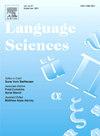Theorizing temporality in multimodal communication: linearity and non-linearity in bullet comments
IF 1.1
2区 文学
Q2 EDUCATION & EDUCATIONAL RESEARCH
引用次数: 0
Abstract
The increasingly mediated conditions of online communication call for new theorizations of temporality. Informed by Harris' critique of the Saussurean principle of linearity, we build on Duncker's methodological innovations and reassert the importance of examining temporality from individuals' first-person perspectives in sign-making activities. By incorporating insights from recent studies on mediated time and the impact of digital technologies on temporal experiences, we seek to refine the integrationist notions of cotemporality and sequentiality. Our approach develops a more dynamic view structured around the dialectically paired metaphors of linearity and non-linearity drawn from Hutton's work. The strengths of this new view are illustrated through a case study of bullet comments, a multimodal writing function embedded in videos, whereby Chinese social media users engage in non-linear wordplay, unsettle the video's content, introduce new linear temporal structures and construct ritualistic semiotic events. We contend that this reconceptualized temporality proves essential for understanding users' creative practices and bonding experiences in the digital space. We also briefly discuss how this understanding of temporality aligns with social media users' general experiences in the current age of information overload and fragmented time.
多模态交流中的时间性理论化:项目符号注释中的线性和非线性
网络交流日益中介化的条件要求新的时间性理论。通过Harris对索绪尔线性原则的批判,我们在Duncker的方法论创新的基础上,重申了在标识制作活动中从个人第一人称角度审视时间性的重要性。通过结合最近关于中介时间和数字技术对时间体验的影响的研究的见解,我们试图完善共时性和顺序性的整合主义概念。我们的方法围绕从赫顿的作品中提取的线性和非线性的辩证配对隐喻发展了一个更动态的观点。这一新观点的优势是通过对子弹评论的案例研究来说明的,子弹评论是嵌入在视频中的多模态写作功能,中国社交媒体用户参与非线性文字游戏,扰乱视频内容,引入新的线性时间结构并构建仪式符号事件。我们认为,这种重新概念化的时间性对于理解用户在数字空间中的创造性实践和结合体验至关重要。我们还简要讨论了这种对时间性的理解如何与当前信息过载和时间碎片化时代的社交媒体用户的一般体验相一致。
本文章由计算机程序翻译,如有差异,请以英文原文为准。
求助全文
约1分钟内获得全文
求助全文
来源期刊

Language Sciences
Multiple-
CiteScore
2.90
自引率
0.00%
发文量
38
期刊介绍:
Language Sciences is a forum for debate, conducted so as to be of interest to the widest possible audience, on conceptual and theoretical issues in the various branches of general linguistics. The journal is also concerned with bringing to linguists attention current thinking about language within disciplines other than linguistics itself; relevant contributions from anthropologists, philosophers, psychologists and sociologists, among others, will be warmly received. In addition, the Editor is particularly keen to encourage the submission of essays on topics in the history and philosophy of language studies, and review articles discussing the import of significant recent works on language and linguistics.
 求助内容:
求助内容: 应助结果提醒方式:
应助结果提醒方式:


